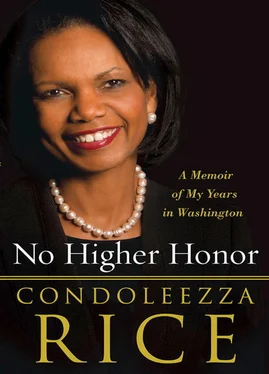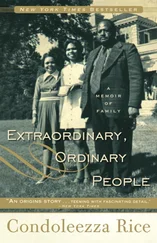The national security advisor is left to sort out those tensions. In general, I got along well with my colleagues. The Vice President had direct access to the President, and he used it. After those conversations, though, the President would fill me in on the Vice President’s thinking, so that I was rarely blindsided. Often the Vice President and I talked directly about what was on his mind. Later, when I became secretary of state, he and I often disagreed and argued vociferously in front of the President. But it was never personal.
That was not always true of the Vice President’s staff. At the start, there had even been one attempt to alter a long-standing tradition by having the Vice President chair the powerful Principals Committee, made up of the Cabinet secretaries, in place of the national security advisor. I went to the President and said, “Mr. President, this is what the NSA does: convene the national security principles to make recommendations to you.” He agreed, and that was the end of that. Later, Steve Hadley told me that he’d spoken to the Vice President who’d acknowledged that it was a stupid idea.
The problem was that the Vice President’s staff, which seemed very much of one ultra-hawkish mind, was determined to act as a power center of its own. Many things were done “in the name of the Vice President,” whether he had directed them to be done or not. To be sure, he shared his staff members’ views; they were not substantively out of line with his thinking. But some of the bureaucratic games that the Office of the Vice President played were not characteristic of my dealings with their boss.
My relationship with Don Rumsfeld was considerably more complicated, though not in the ways that accorded with common wisdom in Washington. Don and I had been friends for a number of years. I first met him when we participated in a three-day “continuity of government” exercise to prepare for nuclear war. (The Cold War was not yet over.) He played the President, and I was his chief of staff. Over the years we remained in contact, and Don and his wife, Joyce, gave dinners for me or joined me for a meal when Stanford business took me to Chicago. Don tried to recruit me to a couple of corporate boards on which he served, and it was I who helped recruit Don to George W. Bush’s cause in 1999. What’s more, when initial secretary of defense candidates fell by the wayside during the transition, I recommended to the President-elect that he choose Don, pointing out that he was known to be a tough bureaucratic infighter but that he “knew where the bodies were buried in the Pentagon” and would be able to carry out the much-needed post–Cold War transformation of our military forces.
Throughout the ups and downs of the term, our relationship remained cordial. Don would come to my Christmas party and heartily sing “We Three Kings.” For a long time I saved a letter that Don sent me in 2006 offering me his weekend home on Maryland’s eastern shore should I want to get away from Washington. I knew that without proof no one would believe it. In other words, the tension that did build between us was not a problem of personal animosity but rather of professional conflict.
I am convinced that Don simply resented the role I had to play as national security advisor. He would become frustrated when my staff would reach out to military officers in the Pentagon to coordinate the particulars of a policy among the agencies. This was a routine responsibility for the NSC, but for some reason Don interpreted such actions as a violation of his authority.
In December 2002 he sent me a “snowflake” saying that I “was not in the chain of command”—a fact I well understood—and that if my staff and I did not stop “giving tasks and guidance” to the combatant commanders and the joint staff, he would take his objections to the President. I found the tirade amusing if slightly condescending and wished he had taken it to the President. I am confident that the President too would have found it bizarre.
This animosity toward my role resulted in complaints about the NSC process. Don wasn’t party to my conversations with the President about matters before the NSC and assumed that I was substituting my own preferences for the views of the principals. He complained that I kept seeking consensus when the President should have been given a decision memo—so that he could just decide. Sometimes the President directed me to try one more time to find common ground. Sometimes he listened to the debate in the NSC and then told me what he wanted to do. George W. Bush had no trouble making decisions when the search for consensus failed. Often, though, it is preferable for the national security advisor to deliver the news that a Cabinet secretary has been overruled than to have the President do it. And sometimes a decision memo where the President checks a box fails to reflect the complexity of the reasoning that led to that decision—and, should it be leaked to the press, is sure to be misrepresented as a victory for one Cabinet secretary and a loss for another in the policy debate.
It is also not true as the press once reported that Don ever refused to return my phone calls. I would not have put up with that, and neither would the President. Don, Colin, and I spoke almost every morning, our travel schedules permitting. Don did dislike NSC Principals meetings, letting it be known that they were an unwelcome distraction from his day job of running the Pentagon, but our lines of communication were never closed.
Ironically, I came to have some sympathy with this view when I became secretary of state. The national security advisor’s work is to coordinate various departments and to staff the President. The NSC staff numbers about a hundred people. The job is demanding but very different from the line responsibilities of the Cabinet secretaries, who must manage huge organizations (State has fifty-seven thousand employees worldwide, the Pentagon seven hundred thousand civilians alone) that are constantly in need of oversight, attention, and decision making. There is always some surprise landing on the secretary’s desk, and frequently it is already public and largely beyond resolution. Big organizations are just difficult to manage, and as Secretary of Defense Bob Gates and I used to say to each other, only half jokingly, “You never know what your building is doing until it’s too late.”
Cabinet secretaries, as constitutional officers, also have responsibilities to Congress. Members of Congress expect a secretary to direct his or her attention to a host of issues ranging from the plight of individual constituents to major policy choices. There are constant reporting requirements, briefings, and sometimes hearings. Add to that press demands, ceremonial functions, and a demanding travel schedule, and there is never enough time. A two-hour NSC Principals meeting is core to the national security advisor’s mission but a drain on the time of a secretary, who can end up making the trip to the White House two or three times a day.
The truth is that we would have had fewer Principals meetings had the distrust between Don and Colin not made the levels below the secretaries largely incapable of taking decisions. The two had dissimilar styles: Colin was a cautious consensus builder in international politics, and Don was confrontational. Don rarely saw shades of gray on an issue, while Colin almost always saw nuances. This, of course, reflected their different roles, but it was more than that; it was a matter of personality and worldview as well. Don’s more black-and-white view of the world sometimes accorded more closely with that of the President in the early days, particularly after 9/11.
The other major challenge with Don was his secretiveness in running the Pentagon. He claimed to delegate decision making to lower levels, but then didn’t always ratify what his lieutenants had done. The people who worked for him were fearful of his wrath. The atmosphere in the Pentagon was one where nothing was really settled until the secretary had opined. That handicapped the Deputies Committee (the number twos in the departments) that Steve chaired and made necessary the very Principals meetings that Don detested.
Читать дальше












